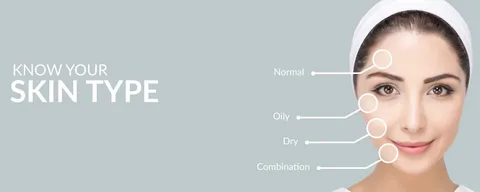Your skin type is the most important factor when starting a skincare routine. There are five main skin types. Oily, normal, combination, dry, and sensitive are the types of skin. Each has its own benefits and challenges. Before starting your skincare routine, you should understand your skin type. In this article, we will discuss how to determine your skin type?
The type of skin is determined by genetics
There are two simple methods for identifying your skin type at home. This article will discuss each skin type’s defining characteristics and advise you on your skin’s unique needs.
Types Of Skin
There are five basic skin types. In this article, we will discuss each skin type one by one.
Oily Skin
Oily skin produces a higher-than-average amount of sebum, the skin’s natural oil. This excess oiliness can make the skin appear shiny or greasy. Due to this excess oiliness, blackheads and enlarged pores appear on the skin. Closed pores are a major contributor to breakouts. People who have oily skin may also be prone to breakouts.
Causes Of Oiliness
Oiliness can vary depending on the time of year or the weather. The following are things that can cause oiliness.
- Puberty or other hormonal imbalances
- Stress
- Heat or too much humidity
- Ways Of Caring For Oily Skin
- Wash it no more than twice a day after you sweat a lot.
- Use a gentle cleanser, and don’t scrub.
- Don’t pick, pop, or squeeze pimples. They’ll take longer to heal.
Dry Skin: How To Determine Your Skin Type?
Dry skin is the opposite of oily skin. In this skin type, there is not enough oil. It may look dull or tight.While severe dryness can cause the skin to crack, flake, or peel. Dry and dehydrated skin are sometimes used interchangeably, but they’re not the same. Dehydration is a lack of water, and that can happen to anyone. Dry skin is considered if those people’s skin do not have enough oil.
If your skin is dry then you may have:
- Almost invisible pores
- Dull, rough complexion
- Red patches
- Less elastic skin
- More visible lines
- Your skin can crack, peel, or become itchy, irritated, or inflamed. If it’s very dry, it can become rough and scaly, especially on the backs of your hands, arms, and legs.
Causes Of Dry Skin:
- Your genes
- Aging or hormonal changes
- Weather such as wind, sun, or cold
- Ultraviolet (UV) radiation from tanning beds
- Indoor heating
- Long, hot baths and showers
- Ingredients in soaps, cosmetics, or cleansers
- Medications
Combination Skin: How To Determine Your Skin Type?
Combination skin is a skin type that shows two or more defining characteristics like dryness and oiliness in different areas. Oftentimes, people with combination skin will have an oily T-zone (forehead, nose, and chin), while their cheeks will be drier.
Combination skin can have:
- Pores that look larger than normal because they’re more open
- Blackheads
- Shiny skin
Sensitive Skin
Sensitive skin has a heightened sensitivity to stressors, such as some skincare products. Degrees of sensitivity vary from person to person. Some people only experience mild irritation when exposed to stressors, while others struggle with redness, itching, and discomfort regularly. However, sensitivity isn’t always visible sometimes, it’s just about how the skin feels.
Normal Skin
That skin that displays as well-balanced and displays no persistent skin concerns is considered to be normal skin. Normal skin is not too dry and not too oily.
Normal skin has:
- No or few imperfections
- No severe sensitivity
- Barely visible pores
- A radiant complexion
Why It Is Necessary To Know About Skin Type?
Before you buy skin care products, it’s a good idea to know your skin type and other things that contribute to the look and feel of your skin, like:
- Skin Complexion
What is your skin complexion? Does your skin burn easily, rarely, or never?
- Skin Care Goals
Are you trying to prevent premature aging? Do you have a skin problem, such as acne or rosacea, or other concerns, such as dark circles under your eyes or fine lines?
- Personal Habits
Do you smoke?
Do you spend a lot of time in the sun?
Do you take a daily vitamin?
Do you eat a well-balanced diet?
All these factors may affect how you should care for your skin. After understanding these factors you can find skin care products that suit you.
Top Ways Of Skin Care
No matter your skin type, these tips will keep it looking its best. By following these top ways of skincare, you can feel reassured that you are taking the best care of your skin.
- Use a broad-spectrum sunscreen that blocks both UVA and UVB rays.
- Avoid direct sunlight, and wear a hat and sunglasses.
- Don’t smoke.
- Drink more water.
- Wash your skin gently but thoroughly daily, and never wear makeup to bed.
- Moisturize.
Can Your Skin Type Change?
Skin type can change. When you’re a teenager, the skin type is mostly oily or blemish-prone. However, it doesn’t mean that you’ll have oily skin forever. As you get older, your skin gets drier, and other changes also appear in your skin with time.
Other factors, like your climate, may also impact your skin type. Hot weather and humidity can be linked to oilier skin, while cold, dry air is often associated with dryness.
How To Determine Your Skin Type?
There are two simple methods for identifying your skin type at home. The two methods are the following:.
The Bare-Faced Method
Carefully studying your bare skin is an easy way to determine your skin type. You can start by washing your face with a mild foaming cleanser, like Calendula Deep Cleansing Foaming Face Wash, which is gentle enough for all skin types. When you complete lathering up, gently tap your face dry with a clean towel. And abstain from applying any skincare products.
After 25-30 minutes, observe your skin’s appearance and feel. If it feels tight, dry, and uncomfortable, you probably have dry skin. Those with excessive shine fall into the oily skin category. If your skin exhibits both oily and dry areas, you likely have combination skin. Irritation indicates sensitivity, and having none of these concerns probably means you have normal skin.
The Blotting Sheet Method
Another simple way to determine your skin type at home is to press a clean blotting paper against different areas of your face. Then, hold the sheet to a light to see how much oil was absorbed. If there is more oil on the paper, your skin is probably oilier. Similarly, you may have dry skin if you see little to no oil. Finally, if the blotting sheet only reveals minimal oil from your T-zone, you probably have a combination or normal skin type. For best results, you should perform this test around midday or evening.
How To Care For Your Skin Type?
After understanding your skin type, you should know the ways of caring for your skin according to that type.
For Oily Skin
People with Oily skin have blemishes, shininess, and clogged pores. Caring for this skin type can seem tricky because it still needs moisture but doesn’t need any more oil. If you have oily skin, you want to reach for products that provide lightweight hydration and help absorb excess oil without clearing your skin’s natural moisture barrier. The natural moisture barrier is the first line of defense between you and the outside world. Regular peeling can also help keep closed pores and blemishes to a minimum.
Detoxifying masks, like the Rare Earth Deep Pore Minimizing Cleansing Clay Mask, are suitable for oily skin. People with oily skin should use these masks in their weekly routine. This award-winning mask with Amazonian white clay helps draw out impurities, like dirt and oil, to deep-clean the skin and pores. It’s clinically demonstrated to help reduce surface oil by 46% in a single application. Regularly using these masks for a long time helps minimize enlarged pores and reduces blackheads for smoother, more refined-looking skin.
For Dry Skin
While dryness and dehydration are two different things, the lack of oil in dry skin makes it less able to retain water. The skin’s natural moisture barrier can only work as effectively as needed with sufficient moisture. This leaves the skin vulnerable to many concerns, from minor irritation to signs of premature aging. To care for dry skin, you should use products that help nurture and protect the skin’s natural moisture barrier. Emollient ingredients like squalane can help restore the skin when it’s dry.
For Combination Skin
Combination skin can be tricky to care for. Gentle treatments that provide lightweight moisture without weighing down or drying out the skin are typically recommended. Balance is key.
Look for gentle products suitable for all skin types, like Calendula Serum-Infused Water Cream. This fast-absorbing moisturizer with calendula extract soothes and hydrates the skin, keeping it feeling soft for up to 24 hours. Continued use also helps improve skin tone and texture for a fresh, radiant appearance.
For Sensitive Skin
Experts agree that sensitivity ultimately stems from disrupting the skin’s natural moisture barrier. When the barrier doesn’t work properly, stressors that it should be able to resist can get past your skin’s weakened defenses and devastate it, causing redness and discomfort. Mild products are very suitable for stressed skin if you want your skin to feel comfortable.
Our Cannabis Sativa Seed Oil Herbal Concentrate Face Oil is a great option for sensitive skin types. This non-comedogenic oil with hemp-derived Cannabis sativa seed oil helps calm the feelings of stressed skin. It helps in balanced hydration. It also helps visibly reduce skin redness and provides skin with relief from discomfort.
For Normal Skin
Care for normal skin types is very easy. In this case, you have to maintain your skin’s natural balance. Your routine should include, at a minimum, a gentle cleanser, a lightweight moisturizer, and a broad-spectrum sunscreen to help protect your skin from the sun’s damaging rays.
Wash your face with Ultra Facial Cleanser in the morning and at night. This iconic cleanser, which contains avocado oil and glycerin, gently melts away dirt and other impurities without disrupting the skin’s natural moisture barrier.
Frequently Asked Questions
Q: What Are The Four Skin Types?
A: There are four types of healthy skin: normal, dry, oily, and combination skin. Skin type is determined by genetics. However, the condition of our skin can vary greatly according to various internal and external factors.
Q: How Can I Identify My Skin Type?
A: Bare-Face Method is used to check skin type. Don’t apply anything on your face, and wait for 30 minutes. If your skin feels parched, you have dry skin. If your entire face starts to get oily, you have oily skin. If your T-zone starts to secrete oil, you have combination skin.


